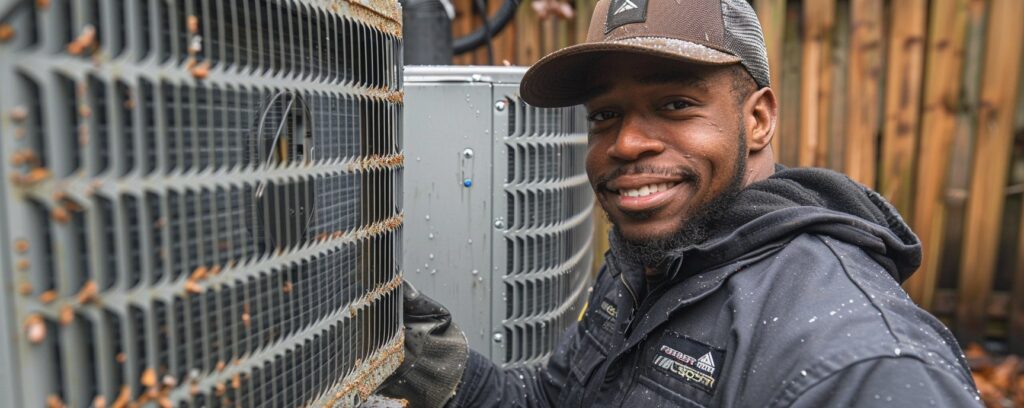The HVAC (Heating, Ventilation, and Air Conditioning) industry plays a vital role in keeping our homes and workplaces comfortable, safe, and energy-efficient. Behind the scenes of every well-functioning HVAC system are skilled professionals who design, install, and maintain these systems. Among these professionals, HVAC apprentices are the future workforce, learning the ropes and acquiring the skills needed to excel in this rewarding field.
In this article, we’ll take you through the essential steps to become an HVAC apprentice, from understanding the industry to securing an apprenticeship. We’ll also explore why choosing an HVAC apprenticeship is a wise career move and provide valuable insights into where HVAC apprentices work, the salaries they can expect, and the potential for career growth. Whether you’re a recent high school graduate exploring career options or someone looking to switch careers, this guide will help you embark on your journey toward becoming an HVAC apprentice.
Steps to Become an HVAC Apprentice
1. Research the HVAC Industry
Before diving headfirst into the HVAC apprenticeship journey, it’s crucial to understand the HVAC industry’s significance and the opportunities it presents. HVAC professionals are in demand year-round, as both residential and commercial properties rely on heating and cooling systems to maintain comfortable temperatures. As an HVAC apprentice, you’ll be part of a critical workforce responsible for ensuring these systems function optimally.
Take the time to explore the HVAC industry, its various sectors, and the role of HVAC technicians and apprentices within it. Consider the impact of HVAC on energy efficiency, environmental concerns, and the overall well-being of individuals and communities.
Additionally, reflect on your personal interests and long-term goals. Do you have a passion for problem-solving, hands-on work, and technology? Are you excited about the prospect of a career where no two days are the same? If so, pursuing an HVAC apprenticeship could be the right path for you.
2. Educational Requirements
The journey to becoming an HVAC apprentice begins with meeting certain educational prerequisites. Most HVAC apprenticeship programs require candidates to have a high school diploma or its equivalent, such as a GED. This foundational education ensures that apprentices have a basic understanding of mathematics, science, and communication skills, which are essential for success in the HVAC field.
While a high school diploma is the minimum requirement, it’s worth noting that some candidates may choose to enhance their prospects by taking relevant coursework during high school. Courses in subjects like mathematics, physics, and mechanical technology can provide a strong foundation for understanding HVAC systems and their underlying principles.
Keep in mind that the educational requirements may vary slightly depending on the specific HVAC apprenticeship program you choose. Therefore, it’s advisable to research your chosen program’s prerequisites to ensure you meet them before applying.
3. Find HVAC Apprenticeship Programs
With a solid understanding of the HVAC industry and the necessary educational background, the next step is to identify and research HVAC apprenticeship programs. These programs are typically offered by trade schools, unions, or HVAC companies. Begin your search by looking for reputable institutions or organizations in your area that offer apprenticeships.
4. Apply for Apprenticeship
Once you’ve identified potential HVAC apprenticeship programs, it’s time to prepare your application. Craft a well-structured resume that highlights your educational background, any relevant coursework, and any previous work or volunteer experiences that demonstrate your commitment to the field. Write a compelling cover letter expressing your interest in becoming an HVAC apprentice.
5. Interview and Assessment
After submitting your application, you may be invited for an interview and assessment. Be prepared to discuss your motivations for pursuing an HVAC apprenticeship, your understanding of the HVAC industry, and your willingness to learn and work as part of a team. Some programs may also require you to complete written or practical assessments to evaluate your technical aptitude.
6. Secure Apprenticeship
Successfully passing the interview and assessment stages can lead to the exciting moment of securing an HVAC apprenticeship. At this stage, you’ll likely need to complete paperwork and agreements with your chosen apprenticeship program. Be sure to review and understand the terms and conditions, including the duration of the apprenticeship and any financial arrangements.
7. On-the-Job Training
The heart of your HVAC apprenticeship is the on-the-job training phase. Here, you’ll work under the guidance of experienced HVAC technicians, learning the practical skills necessary for the trade. You’ll gain hands-on experience in tasks such as installing, repairing, and maintaining HVAC systems. This phase is essential for building your technical competence and confidence.
8. Classroom Instruction
In addition to on-the-job training, most HVAC apprenticeship programs include classroom instruction. These classes cover a wide range of topics related to HVAC systems, safety protocols, industry regulations, and best practices. Classroom instruction complements your hands-on experience, providing you with a well-rounded education in HVAC technology.
9. Earn Relevant Certifications
To enhance your credibility and career prospects as an HVAC apprentice, consider pursuing relevant certifications. Organizations like the North American Technician Excellence (NATE) offer certifications that demonstrate your expertise in specific areas of HVAC. Earning certifications can open doors to higher-paying positions and opportunities for advancement in the future.
Why Become an HVAC Apprentice
Becoming an HVAC apprentice is a decision that can set you on a path to a rewarding and stable career. But why should you consider this route in the first place? Here are some compelling reasons to become an HVAC apprentice:
Job Security: HVAC systems are integral to our daily lives, and they require regular maintenance and upgrades. This means that there is a consistent demand for skilled HVAC professionals. Regardless of economic fluctuations, people will always need comfortable and properly functioning heating and cooling systems.
Career Growth: As an HVAC apprentice, you’re not just embarking on a job; you’re starting a career with significant growth potential. With experience and additional training, you can advance to higher positions, such as HVAC technician, installer, or even project manager. The HVAC industry rewards dedication and expertise.
Hands-On Work: If you enjoy hands-on work and problem-solving, HVAC is a field that offers plenty of opportunities to get your hands dirty. You’ll work with a variety of tools and equipment, diagnosing issues and finding solutions. Every day on the job brings new challenges and learning experiences.
Diverse Work Settings: HVAC professionals are needed in various settings, including residential homes, commercial buildings, and industrial facilities. This diversity allows you to explore different environments and choose a niche that suits your interests.
Skills Development: An HVAC apprenticeship provides you with a valuable skill set that is in demand not only in the HVAC industry but also in related fields such as plumbing and electrical work. These skills are transferable and can open doors to various career opportunities.
Sustainability and Innovation: The HVAC industry is evolving to embrace more energy-efficient and eco-friendly solutions. As an HVAC apprentice, you can be at the forefront of this innovation, helping reduce energy consumption and environmental impact.
Where do HVAC Apprentices Work?
HVAC apprentices work in a variety of settings, reflecting the diverse needs for heating, ventilation, and air conditioning services. Here are some common work environments for HVAC apprentices:
1. Residential Settings: Many HVAC apprentices start their careers by working in residential settings. This includes homes, apartments, and condominiums. In these environments, you’ll be responsible for installing, repairing, and maintaining HVAC systems in individual residences, ensuring that homeowners have comfortable living spaces year-round.
2. Commercial Buildings: Commercial HVAC systems are often more complex and larger in scale than residential ones. HVAC apprentices working in commercial settings may be involved in projects for offices, shopping malls, restaurants, and other businesses. They ensure that these spaces have efficient climate control systems.
3. Industrial Facilities: In industrial settings, HVAC systems play a crucial role in maintaining the safe and efficient operation of factories, warehouses, and manufacturing plants. HVAC apprentices working in industrial facilities work on systems that regulate temperature, humidity, and air quality to support production processes.
4. Healthcare Facilities: Hospitals and medical facilities require precise temperature and air quality control to ensure the well-being of patients and the integrity of medical equipment. HVAC apprentices in healthcare settings contribute to maintaining these critical conditions.
5. Educational Institutions: Schools, colleges, and universities rely on HVAC systems to provide a comfortable learning environment. HVAC apprentices working in educational institutions help maintain these systems, ensuring optimal conditions for students and staff.
6. Government Buildings: Government buildings, including offices and courthouses, require reliable HVAC systems for the comfort and productivity of employees and visitors. HVAC apprentices in government settings help maintain these systems.
7. Specialized Settings: HVAC apprentices can also find opportunities in specialized settings such as data centers, research laboratories, and cleanrooms. These environments have unique HVAC requirements to support their specific operations.
Where you choose to work as an HVAC apprentice may depend on your interests and career goals. Each setting offers its own challenges and rewards, and your apprenticeship experiences will help shape your future in the HVAC industry.
HVAC Apprentice Salary
Understanding the financial aspects of an HVAC apprenticeship is essential as it helps you plan your career and set realistic expectations. HVAC apprentices earn compensation for their work, although the pay may vary based on several factors. Let’s delve into the details:
Average Salary
On average, an HVAC Apprentice makes between $15-$18 per hour.The average salary for HVAC apprentices can vary by location, experience, and the specific apprenticeship program you join. On average, HVAC apprentices typically earn a modest starting wage, which can increase as they gain experience and complete different phases of their apprenticeship.
Highest HVAC Apprentice Salary
While the starting salary for HVAC apprentices is relatively modest, it’s essential to note that the potential for higher earnings exists as you progress in your career. With dedication, experience, and certifications, HVAC apprentices can advance to become HVAC technicians, and their earnings can increase significantly.
HVAC professionals with years of experience and expertise may earn annual salaries well above the national average. These individuals often benefit from their knowledge of advanced HVAC systems, the ability to troubleshoot complex issues, and strong customer service skills.
Highest Paying States
The salary you can expect as an HVAC apprentice also depends on your location. Some states offer higher wages due to the cost of living, demand for HVAC services, and local economic factors. As of my last update, states with high demand for HVAC professionals and higher wages for apprentices included:
1. Alaska
2. Massachusetts
3. New York
4. Connecticut
5. Hawaii
However, regional wage variations can change over time, so it’s crucial to research the current wage rates and opportunities in your specific area.
Keep in mind that while the starting salary for HVAC apprentices may not be as high as some other professions, the potential for career growth and increased earnings is significant. As you gain experience, acquire certifications, and become a skilled HVAC technician, you’ll have the opportunity to command higher wages and potentially start your HVAC business.
HVAC Apprentice Career and Job Growth
Choosing to become an HVAC apprentice is not just about the immediate job opportunity but also about securing your future in a growing field. The HVAC industry offers several promising aspects for career growth:
Job Stability: HVAC systems are integral to our daily lives, and their maintenance is a year-round necessity. This means that HVAC professionals, including apprentices, enjoy a level of job security that is not as affected by economic fluctuations compared to some other industries.
Advancement Opportunities: Starting as an HVAC apprentice is just the beginning. With experience and dedication, you can advance to become an HVAC technician, installer, or even a project manager. These roles come with increased responsibilities and higher salaries.
Specialization: The HVAC field offers opportunities for specialization. You can focus on areas such as residential HVAC, commercial HVAC, industrial HVAC, or even specialize in specific types of systems like refrigeration or energy-efficient technologies.
Entrepreneurship: Some HVAC apprentices eventually decide to start their HVAC businesses. With the right skills, certifications, and business acumen, you can become an independent HVAC contractor and enjoy the freedom of being your boss.
Continual Learning: The HVAC industry is always evolving, with new technologies and energy-efficient solutions being developed. HVAC professionals need to stay updated with the latest advancements, which means continual learning and professional development opportunities.
As an HVAC apprentice, you’re not just entering a job; you’re entering a dynamic and growing industry with numerous possibilities for career advancement and personal growth.
How Long is an HVAC Apprenticeship?
The duration of an HVAC apprenticeship can vary depending on factors such as the specific program, location, and the apprentice’s progress. Typically, an HVAC apprenticeship lasts between 3 to 5 years. During this time, apprentices undergo a combination of on-the-job training and classroom instruction.
The apprenticeship period is designed to provide comprehensive training and ensure that apprentices gain the necessary skills and knowledge to become competent HVAC technicians. Apprentices start with basic tasks and gradually take on more complex responsibilities as they advance through the program.
While the duration may seem relatively lengthy, it’s important to remember that the skills and expertise acquired during the apprenticeship lay the foundation for a successful and rewarding career in the HVAC industry. As an apprentice, you’ll have the opportunity to learn from experienced professionals, gain hands-on experience, and build a strong foundation of knowledge in heating, ventilation, and air conditioning systems.
Upon completing your apprenticeship, you’ll be well-prepared to take on the responsibilities of a qualified HVAC technician and embark on a path of continued growth and advancement in the field.
HVAC Apprentice FAQ
As you embark on your journey to becoming an HVAC apprentice, you may have several questions about the process, responsibilities, and career prospects. Here are some frequently asked questions and their answers:
What degree do I need to become an HVAC Apprentice?
The minimum educational requirement is a high school diploma or its equivalent. However, some apprenticeships may prefer candidates with relevant coursework or an associate’s degree in HVAC technology.
What does an HVAC Apprentice do?
HVAC apprentices work alongside experienced technicians and are involved in tasks such as installing, maintaining, and repairing heating, ventilation, and air conditioning systems. They learn to troubleshoot issues, follow safety protocols, and ensure systems operate efficiently.
How long does it take to become an HVAC Apprentice?
The duration of an HVAC apprenticeship can vary but typically lasts about 3 to 5 years. It includes a combination of on-the-job training and classroom instruction.
How much do HVAC Apprentices make?
HVAC apprentices’ salaries can vary based on factors such as location, experience, and the specific apprenticeship program. On average, apprentices can expect modest starting salaries of $15-$18 an hour that increase as they progress in their apprenticeship.
What skills do I need to be an HVAC Apprentice?
Essential skills include problem-solving, attention to detail, mechanical aptitude, and strong communication skills. Additionally, you should be willing to learn, adapt, and work well in a team.
Are there internship opportunities for HVAC Apprentices?
While apprenticeships are structured training programs, some HVAC companies may offer internships or pre-apprenticeship opportunities for individuals looking to gain initial exposure to the field before formal apprenticeship training begins.
Conclusions
Becoming an HVAC apprentice is not just a career choice; it’s an entry point into a dynamic and essential industry that shapes our daily lives. In this article, we’ve explored the steps to become an HVAC apprentice, the reasons why choosing this path is a smart move, the diverse work environments where HVAC apprentices can thrive, and the financial aspects, including salaries and growth opportunities.
As you embark on your journey to become an HVAC apprentice, remember that this field offers job security, career growth, and the chance to make a real impact on people’s lives. You’ll be working with cutting-edge technology and contributing to the comfort, safety, and energy efficiency of homes and businesses.
Whether you’re a recent high school graduate looking for a promising career or someone seeking a new direction in life, the HVAC industry welcomes individuals with a passion for learning and a strong work ethic. Through hands-on experience, classroom instruction, and a commitment to excellence, you can pave the way to becoming a skilled HVAC technician with a bright future.
Your journey as an HVAC apprentice will be marked by challenges and rewards, but it’s a path that leads to a fulfilling and lasting career. Embrace the opportunities, continually update your knowledge and skills, and watch as you play a vital role in keeping the world comfortable and sustainable through the ever-evolving world of HVAC technology.
In the HVAC industry, the sky’s the limit, and your apprenticeship is just the beginning of what promises to be an exciting and rewarding career journey. So, take that first step towards becoming an HVAC apprentice and start building your future today.




